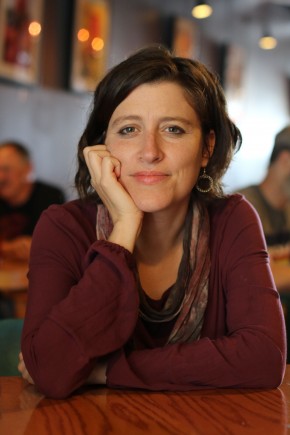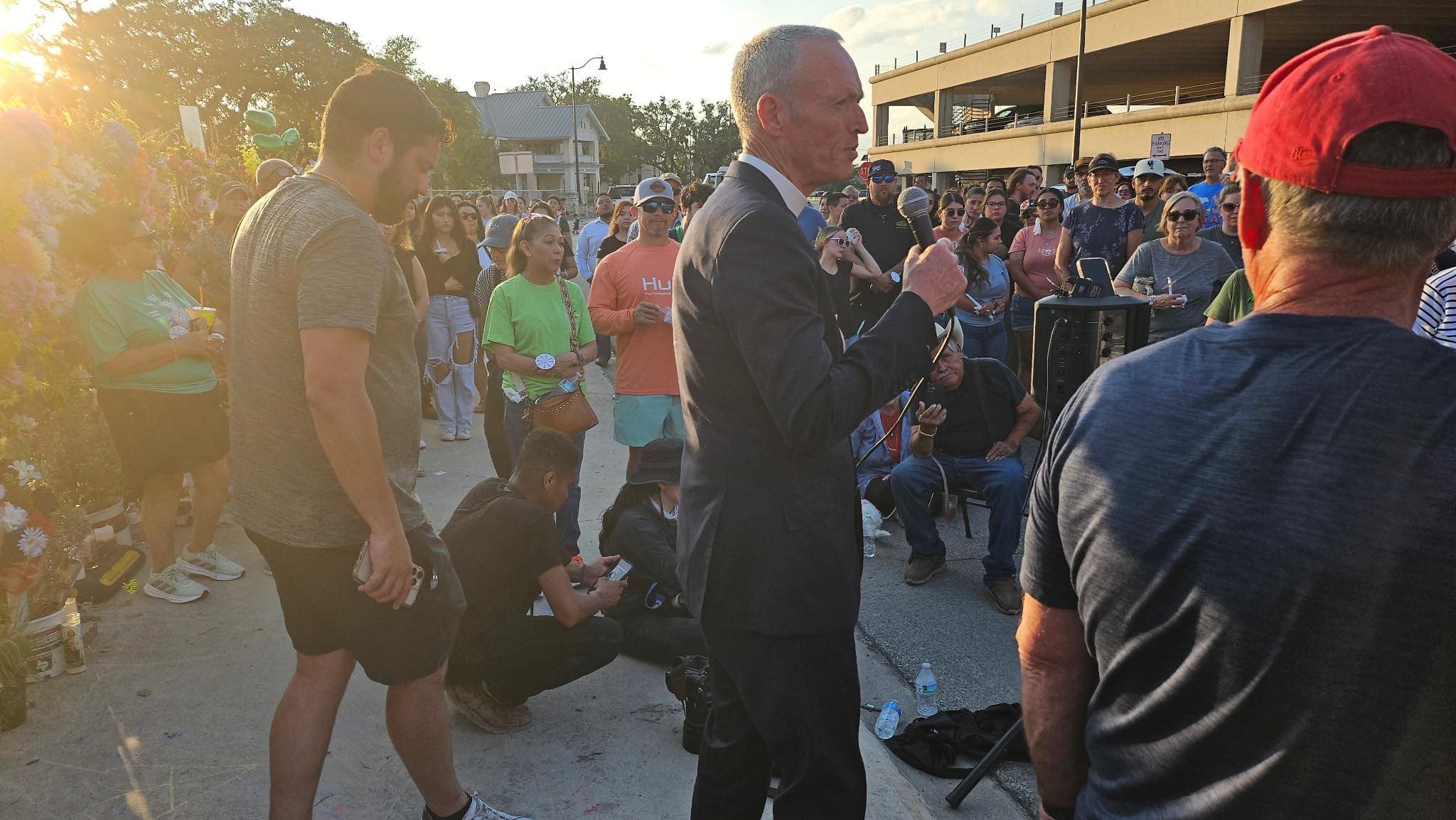Tish Harrison Warren is the author of Liturgy of the Ordinary: Sacred Practices in Everyday Life and a priest in the Anglican Church in North America. After eight years with InterVarsity Graduate and Faculty Ministries at Vanderbilt and the University of Texas at Austin, she now serves as Co-Associate Rector at Church of the Ascension in Pittsburgh, PA. She and her husband Jonathan are the parents of two daughters.
To start things off, where did you grow up and how did your journey of following Jesus begin?
I grew up in central Texas. I was raised in a Southern Baptist Church and was baptized when I was around six years old. I loved Jesus as a small child and remember singing songs to God on the swing set. When I was a little older, through a family move and a tough, dark season in my family, I grew to rely on God in a deeper way. God was really kind to me as a teenager and made himself very apparent and real to me and took care of me, nurturing me in very clear ways. In late high school/early college, I began asking a lot of hard theological questions. I encountered my own sinfulness in new ways—I’d always been this straight-A student and church kid, so though I would assent to being a sinner, the darkness in me was mostly theory. In coming to understand myself as a sinner, I learned about grace in a way I never knew, and it was completely life changing. My Christian faith changed from being about asking Jesus in my heart and being a “good Christian” to giving up on myself and my righteousness and walking in the goodness of Jesus to me. It was a sea change. Grace broke me and remade me.
How did you end up becoming an Anglican?
My husband and I were part of (and on staff at) several Presbyterian churches (PCA). I was drawn to the beauty of Anglicanism in seminary and, through our theology and Church History courses, I was becoming more sacramental in my theology, but we loved (and still love) our church in the PCA. It wasn’t until we moved cities and, for a variety of reasons, could not find a PCA church near us, that we decided to attend a little evangelical Episcopal church. It was a gap year between seminary and my husband’s PhD program, so we didn’t think “we will now be Anglican forever” when we started attending. We just needed a church for the year. But for the first three months we went to this Episcopal church, I’d cry every week. The mystery, beauty, and embodiment of the liturgy and weekly eucharist was so very healing to me. After a few months in this church, we knew we were ruined for any other tradition. We fell in love with the Anglican way of worship (chiefly, the liturgy and the prayer book) and couldn’t go anywhere else. We moved cities again for my husband, Jonathan, to get his PhD and we started attending Church of the Redeemer in Nashville. Around six years later, we were both ordained in that church by Archbishop Duncan.
You are the author of Liturgy of the Ordinary: Sacred Practices in Everyday Life, which won Christianity Today’s Book of the Year Award. What made you decide to write about liturgy?
I wrote this book because I was trying to figure out my own life. In college and in my 20’s, I was part of an evangelical movement that emphasized being “world changers.” I was also deeply impacted by the scriptural call to the poor and to seeking justice. I wanted to take risks and be “radical” for Jesus. Then, I was in my thirties with two tiny kids and a husband getting a PhD and I still wanted those things, but didn’t have the scarcest idea of what that might look like in my actual limited and concrete life.
There were a spate of books at the time—and many were good on embracing the ordinary, but it wasn’t clear to me how and why ordinary life mattered. In the midst of this time, I was newly Anglican and growing in love with liturgy. I also read James KA Smith’s Desiring the Kingdom and was really impacted by his take on Christian formation. Thinking about Christian formation in daily life became immensely important to me. I began finding organic connections between our liturgies on Sunday and the “liturgies” of my time with kids and neighbors and waking and sleeping. I decided to write about one (rather boring) day in my life in conversation with our liturgy in worship in order to look at Christian formation and worship.
Why do you think people struggle with understanding liturgy, thinking that it’s a barrier to worship rather than a doorway?
I think people have seen churches who can recite prayers by rote, but who seem tired, angry, or apathetic. And I think that in America, we think of faith as something that happens inside of us—a feeling in our hearts or a belief in our brains. Those formed in American evangelicalism can come to see faith therefore as a certain internal state of passion or emotion or ardent belief. The idea of encountering God through spiritual practices is a live (and trendy) conversation now in evangelicalism, but it’s still a fairly new idea to many people.
It is fascinating how you tie in every day liturgies in our lives (i.e., simple tasks from making the bed to washing dishes) to the liturgy of the Church. Have you found this opens people’s minds and hearts to trying out liturgy as found in the Prayer Book?
Yes, many people have told me that they were deeply skeptical of liturgical worship, but that they read my book and are now practicing the liturgical calendar or using the prayer book or even started attending an Anglican church. As I said, I grew up in low church evangelicalism and “discovered” liturgy in my late twenties, so I wrote the book with people like me in mind. It’s a very practical introduction to liturgy for beginners—because that’s what I am.
The Anglican Church in North America is getting ready to publish a new Book of Common Prayer for the whole church. You and your husband helped plant a church in Austin. How do you think we can prepare congregations to embrace liturgy, especially in church planting?
One simple way is to get actual prayer books in people’s hands and show them how to use it (which is not at all self-evident. I most often use the ’79 prayer book, and it is certainly difficult to navigate for new folks. I had one parishioner who ordered one online and tried to read it like a normal book, from front to back cover, and was understandably completely baffled about how this was supposed to help her devotionally). Another easy on ramp is to practice—and teach on—the liturgical calendar. This is a great, corporate way to worship and practice formation together. I also love having instructive eucharistic services from time-to-time where a church walks through the liturgy together and stops at each step to explain the meaning and history of a particular liturgical practice.
What has surprised you about the response to your book?
Liturgy of the Ordinary is my first book, and no one ever really knows how a first book will do (or really any book, for that matter), so one thing that has surprised me is how far the book has travelled and how many people have read it. The first few months I was just constantly astonished that people I didn’t personally know were reading the book. It felt miraculous–like sending out a message in a bottle and hearing back from people who found it. Now, the book has reached tens of thousands of people and is being translated into Dutch, French, and Korean. This was more than I could have imagined. I am very grateful and very surprised.
The other thing that has surprised me is how people from so many different traditions have responded to it. Anglican churches are reading it together, but I’ve also heard from Baptist and Methodist churches reading it together. I heard from one man that a men’s group at Bethlehem Baptist Church (John Piper’s former church) were reading it together—and that surprised me. I got a letter from an elder in an Amish Community in Ireland who read and resonated with the book, and I’ve heard from Orthodox priests and Roman Catholic friends—even one Roman Catholic pre-teen who read the book and liked it.
You write a lot about your family life in Liturgy of the Ordinary. How do you find establishing deliberate practices in your ordinary life helps in keeping the balance between family and ministry life?
Well, we are still new priests and (relatively) new parents so we certainly don’t have the balance between family and ministry life completely figured out yet. One practice that has been of utmost importance for us has been keeping the Sabbath. We need one day a week where we crash and where our kids get all of us and don’t have to share us with the whole church. That’s tough though since Sunday is a work day and the kids go to school on Monday morning, so we practice sabbath from after church on Sunday until Monday afternoon, and Sunday evenings are really sacrosanct family time.
What is next for you?
I’m starting on book #2. I’m not ready to tell much about it yet, but I certainly would appreciate prayer for it.
How can we pray for you and your ministry in Pittsburgh?
We are really grateful for our community here in Pittsburgh (Church of the Ascension). Please pray for us to be faithful and to be able to reach those who are skeptical about the faith. Pray that we would be a church that values strugglers and meets Jesus in our weakness. And pray that we will be able to embody the joy and truthfulness of the Gospel and walk in step with the Holy Spirit.
Also, please pray for Jonathan’s and my kids. It is hard to be a preacher’s kid and they are double preachers’ kids. They need a lot of grace for that call.
Finally, please pray for the Anglican Church in North America. It is such a big tent. We have lower-church evangelical types and high-church Anglo-Catholics; we have those against women’s ordination and those all for it; we have those on the political left and those on the right. I love that we are trying to hold together and display a Gospel-rooted unity, but it is a hard road to walk. I believe it is a faithful—and less trodden—road and that this kind of unity witnesses to Christ and His love and grace for His Church. Everything in our culture is increasingly polarized and the Church bears witness to the truth of Jesus through our love for one another. Existing in this unity amidst difference is not easy, but it’s essential. Walking this road together means all of us will be uncomfortable sometimes, and that is a good thing. But, boy, do we ever need prayer and God’s mercy to His Church.
Click here to find Liturgy of the Ordinary: Sacred Practices in Everyday Life on Amazon.
Mary Ailes is Director of Communications for the Diocese of the Mid-Atlantic.





